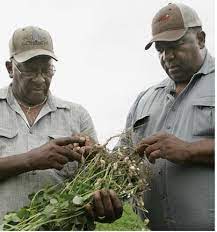
By Smoking Chef
In a groundbreaking move, two Black farmers in Florida have been awarded medical marijuana business licenses as part of a bill signed into law by Governor Ron DeSantis (R) last month.
The state’s legalization legislation, established in 2017, mandated that one medical cannabis business license be designated for a Black farmer who is a participant in the historic “Pigford” class action lawsuit against the U.S. Department of Agriculture (USDA), which alleged discriminatory lending practices.
However, it was only last year that the Florida Department of Health initiated the application process for this special license. Despite the initial announcement of intent to grant the license to farmer Terry Donnell Gwinn, the process was delayed due to legal and administrative challenges from other applicants. This situation prompted the passing of HB 387, a bill that compelled the department to approve licenses for all qualified applicants.
Governor DeSantis signed this bill into law last month, leading to the subsequent approval of licenses for two out of the twelve individuals who submitted applications the previous year. The recipients of these licenses, Terry Donnell Gwinn and Shedrick McGriff, expressed their gratitude to the governor for making this milestone possible.
“Mr. Gwinn is appreciative that the long-awaited Pigford MMTC (medical marijuana treatment center) license has been granted, and he and his team are eager to swiftly proceed with cultivation, processing, and dispensing operations,” shared Gwinn’s attorney, Jim McKee. “Upon receiving cultivation authorization, cultivation activities will commence at his Alachua County cultivation facility,” he added, according to a report by The News Service of Florida.
The legislation also dictates that the department must approve licenses for individuals whose applications have been deemed by an administrative judge to satisfy “all requirements for licensure.” Additionally, it establishes a 90-day curing period for applications that are found to have deficiencies.
Reflecting on this achievement, Gwinn, who is a Black farmer, emphasized his connection to the agricultural history and the need to address past imbalances. “As a Black farmer, I’ve lived through our agricultural history and felt the burden of the disparities we’ve endured,” Gwinn shared with the News Service. “We are preparing meticulously to provide medical cannabis to patients in need.”
Governor DeSantis, a Republican candidate for the 2024 presidential election, maintains his opposition to the legalization of adult-use cannabis. He has stated his commitment to maintaining prohibition if elected to the Oval Office. However, his track record as Florida’s governor presents a mixed stance, with instances of support for the state’s medical cannabis and hemp industries alongside efforts to impose certain regulations.
Recent actions by Governor DeSantis include signing legislation prohibiting the sale of consumable hemp products, including cannabis-infused “chewing gum,” to individuals under 21 years of age. This builds upon an existing restriction on the purchase of smokable hemp by young people.
Furthermore, the governor endorsed a measure that bars residents of sober living facilities from possessing or using medical marijuana, even if they possess a doctor’s certification for therapeutic cannabis use in accordance with state law. Notably, other doctor-prescribed pharmaceutical medications may still be permitted.
The ongoing state Supreme Court case may ultimately shape the fate of cannabis legalization in Florida. A campaign successfully collected sufficient valid signatures to place the issue on next year’s ballot. However, Florida Attorney General Ashley Moody (R) has contested the initiative, urging the court to invalidate it, echoing actions taken against previous reform endeavors.
Separate economic analyses from the Florida legislature and Governor DeSantis’s office project that marijuana legalization could generate annual new sales tax revenue ranging from $195.6 million to $431.3 million, pending voter approval. These figures may increase substantially if lawmakers choose to impose an additional excise tax on cannabis transactions, similar to regulations in other legalized states.
Maureen Meehan 27, June 2023 Benzinga

